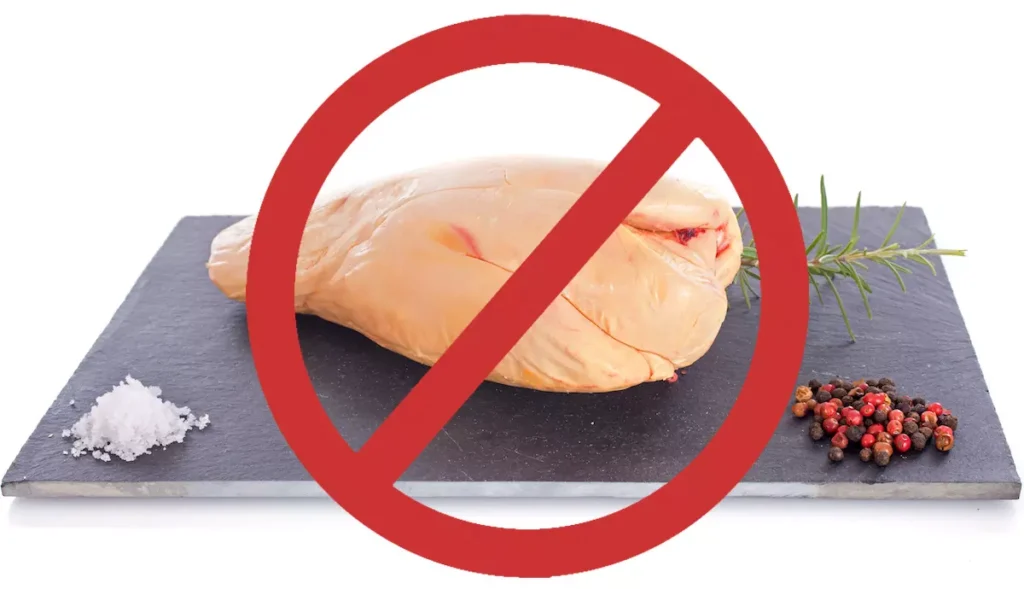Tempe, Arizona — Animal Wellness Action launched of its “Foie Gras Off the Menu” campaign by announcing that the prestigious Top of the Rock Restaurant in Tempe, Ariz. has removed the fatty liver of ducks and geese from its offerings to patrons. Chef Sandy Santiago and manager Lisa Glass also signed a pledge to never offer foie gras in the future, after meeting with members of the Food Policy Committee of Animal Wellness Action. Top of the Rock was voted most scenic and most booked restaurant for the Diners’ Choice Awards 2020.
“We applaud the leaders at Top of the Rock restaurant for recognizing that businesses have responsibilities when it comes to animal welfare,” said Dr. Brandon Burr, Food Policy Chair for Animal Wellness Action. “The chef and the manager there understand that causing chronic distress and disease in animals in order to harvest a small portion of the animal’s body for a luxury item violates any commonsense standard of animal care.”

Foie gras means “fatty liver,” but in practical terms, it also means “animal cruelty.” To produce it, a farmer typically force-feeds ducks and geese so much food that the livers of the animals swell in size. The food is forced into their systems with the aid of long tubes pushed down their throats, and corn is pumped into their stomachs. This process is repeated multiple times per day over several weeks, until their livers swell to ten times the normal size, causing hepatic lipidosis (fatty liver disease). The abnormal increase in fat is what gives the liver a distinctive taste.
“I was very happy to meet with Animal Wellness Action and remove foie gras from our menu at Top of the Rock,” said Sandy Santiago, chef of Top of the Rock Restaurant. “I know foie gras was a controversial issue in California, where I’m from, and I believe I’m doing the right thing by no longer offering it.”
The State of California passed a bill to ban the process of “force feeding of a bird for the purpose of enlarging the bird’s liver beyond normal size,” as well as the sale of products that are a result of this process. New York City also passed an ordinance to ban the sale of foie gras in 2019. Foie gras has typically been served in higher-end urban restaurants, in locales with a strong presence from animal advocates.
Restaurant manager, Lisa Glass, was also very supportive of Chef Sandy’s decision, explaining that she had been against foie gras for a long time, but the previous chef refused to discontinue the item.
Animal Wellness Action intends to engage restaurants and local legislators in the jurisdictions throughout the nation where foie gras is offered on menus. It has a 12-member Food Policy Committee that includes many top animal welfare advocates throughout the nation.
There are only a couple of foie gras producers in the United States, led by Hudson Valley Foie Gras in upstate New York. That company is expected to see a drop in sales with New York City forbidding future sales of foie gras
The Animal Wellness Foundation (Foundation) is a Los Angeles-based private charitable organization with a mission of helping animals by making veterinary care available to everyone with a pet, regardless of economic ability. We organize rescue efforts and medical services for dogs and cats in need and help homeless pets find a loving caregiver. We are advocates for getting veterinarians to the front lines of the animal welfare movement; promoting responsible pet ownership; and vaccinating animals against infectious diseases such as distemper. We also support policies that prevent animal cruelty and that alleviate suffering. We believe helping animals helps us all.
Animal Wellness Action (Action) is a Washington, D.C.-based 501(c)(4) organization with a mission of helping animals by promoting legal standards forbidding cruelty. We champion causes that alleviate the suffering of companion animals, farm animals, and wildlife. We advocate for policies to stop dogfighting and cockfighting and other forms of malicious cruelty and to confront factory farming and other systemic forms of animal exploitation. To prevent cruelty, we promote enacting good public policies and we work to enforce those policies. To enact good laws, we must elect good lawmakers, and that’s why we remind voters which candidates care about our issues and which ones don’t. We believe helping animals helps us all.


